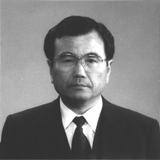
Koichiro Tamura
Directir-General
Electronical Laboratory

|
Koichiro TamuraDirectir-General Electronical Laboratory |
There are only a few years left till 21st century starts. I will not be alone in feeling that the entire world is experiencing drastic change. The rapid development of information technology has become one of the driving forces of such change.
So far, the arrival of the "information society" and of the "advanced information society" has been predicted. But I have a strong feeling that even more drastic movements are evolving than the social changes described in such predictions. The images implied by words such as the "information society" or the "advanced information society," appear to have tacitly presupposed a simple efficiency supremacy doctrine, dependent on centralized computing power typified by mainframes.
However, the decline of this efficiency supremacy doctrine is now evident. In this sense, it can be viewed as a similar phenomenon to the disintegration of the former Soviet Union's political system. The ongoing change in the information technology today is not at all what pundits originally predicted. In fact, society, organization and even people's way of looking at things are becoming increasingly fragmented and that the world is plunging into an epoch of major change. Once we understand this, the assertion that we are witnessing the arrival of the "advanced information society" already sounds out of date. I, then, prefer to use the term "hyper information society."
In the hyper information society, the first consideration is given to the value of information itself rather than the conventionally pursued efficiency of information processing. Information processing is made up of four functions: information generation (input into systems), distribution, processing (computing and editing) and accumulation (for retrieval). The traditionally pursued information-oriented society had aimed at increasing the efficiency of these functions. The need for more efficient functions will never diminish. But yet, what is regarded as all the more important in the hyper information society will be the amount of and, after all, the quality of information generated, processed, distributed and accumulated. You can generate as much information as you like, and information does not waste itself by processing. Therefore, it goes without saying that information itself could be the most valuable resource in a country like Japan which lacks natural resources.
Information is useless if it adds nothing new. The number or quantity is important when it comes to, for instance, cars or bread, regardless of their model or kind. But information does not gain value by being simply copied. This makes originality highly valuable. The value of information falls abruptly with decreasing accuracy. Even though there may be plenty of information available, it is of no use unless you can find from it what you want to know or what is useful to you. In addition, information needs to be up-to-date. These are the reasons why quality, rather than quantity, of information is of key importance.
To prepare for such an epoch, there is a yet stronger demand for innovative technology. The Internet boom may give the impression that information technology has come of age, but it is an illusion.
With a fresh look at information technology from the above viewpoints, the importance of technological issues that the RWC Program is challenging for a future society will be quite understandable, if not self-explanatory, even to the general public.
I hope that researchers and all those involved in this project will continue to open up this new field.